Spoiler warnings for GLOW season 2
Episode 8 of the second season of GLOW was a nostalgic delight. The show took a break from the plot and gave us an in-universe episode of the “Gorgeous Ladies of Wrestling” show, down to the 1980s-style grainy film, cheesy wipe cuts, and era-appropriate commercials.
That episode was a brilliant culmination of the 1980s fun that runs through the show. We all get to giggle at the big hair, shoulder pads, and floppy disks, whether we lived through the 80s ourselves or just find them fascinating. A big theme of GLOW, though, is weaving together that culture shock of a different period with the things that are familiar and very much ongoing. Storylines this season deal with work-family balance, typecasting and racist stereotypes, and harassment in the workplace, among other issues. On some of these matters, it’s evident that “we’ve come a short way, baby.”
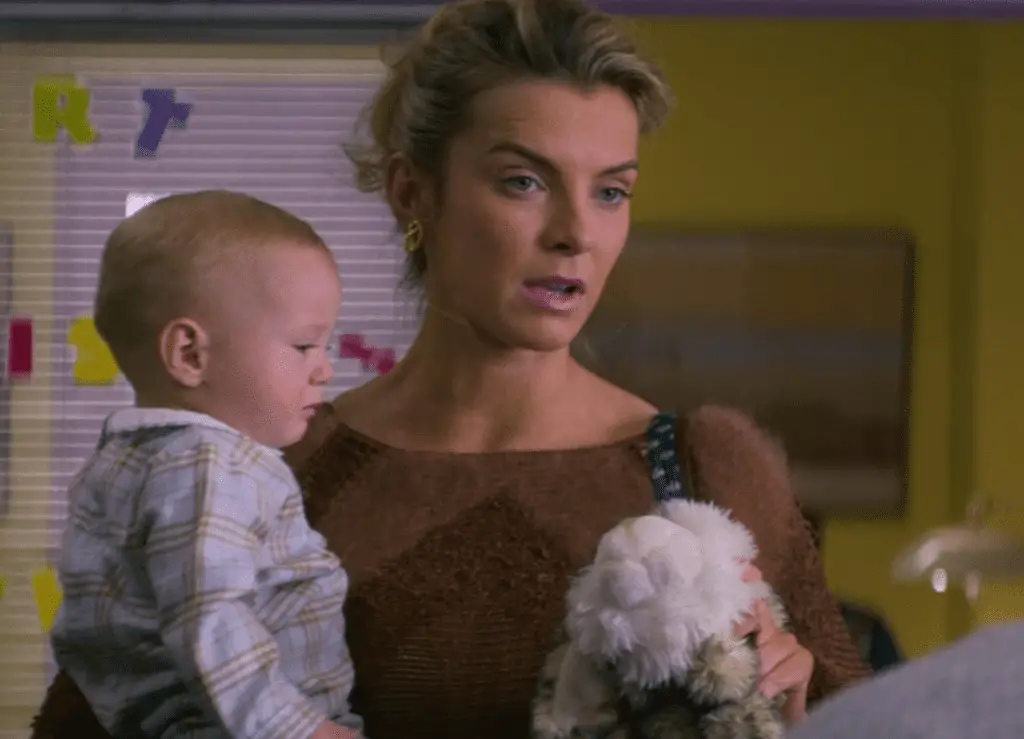
One example of this is the recurring theme of Debbie juggling taking care of her baby and meeting the demands of her job. This season, her job includes being a co-producer as well as an actor and wrestler on the show. Debbie’s life is contrasted with the other wrestlers’ lives: The other wrestlers stay in the motel during filming and go out at night, whereas Debbie commutes back to her house, takes care of her son, and orchestrates handing off her son to day care or to his dad.
Added to this, Debbie is going through a divorce with her husband, Mark, who cheated on her in season 1. Because they’re sharing the parenting duties, she has to cope with seeing Mark all the time, which is emotionally difficult – especially having to confront the fact of his new relationship. On top of it, Mark is judgmental of her parenting, and Debbie feels guilt at her own screw-ups, like leaving her child at daycare. (Tammé reassures her, and us, that all parents screw up: she forgot her son at a store for three hours once, she says, and he grew up fine and now attends Stanford.) At the same time, nobody (including Debbie) seems to question Mark’s ability to parent while working and also fitting in a new relationship.
Debbie is a stiff-upper-lip type who manages, for the most part, to keep all her stress from work-family balance out of the workplace. As she strives to impress the other producers, both men, it seems important to her to let them forget that she has a son. This work-life balance storyline with Debbie resonates with an audience watching in the 2010s. The stresses Debbie is undergoing are the same ones many working moms still undergo, including the sadness they feel not getting to see their child as much as they’d like, plus the judgment they often receive from others and themselves. These are experiences that, even in 2018, are still much more common in moms than in dads.
Debbie has another challenge in season 2 that resonates with a modern audience. She has finagled her way to a position as a co-producer, and she puts a lot of effort into excelling at this new role – effort which goes ignored by Sam and Bash for much of the season. They continually shut her out of production meetings and decision-making, to her frustration, or forget about her producer status until she reminds them. She invites Sam and Bash to dinner at her house in an attempt to balance the need for a meeting with her obligation to be home with her son. The men don’t show up to the dinner, signaling that Debbie’s presence at meetings is just not important enough to them to try to accommodate her.
The phrase “Lean In” hasn’t become a motto yet in the 80s, but Debbie embodies that kind of ethic as she works hard on being recognized as an important third producer. This culminates in her working closely with Bash at the TV expo in episode 9, concocting a plan to win over TV executives. You get the sense in the TV expo scenes that Debbie is finally recognized as an equal, at least by Bash. Despite this happy ending, it took all season for Debbie to achieve the status, respect, and equal decision-making power that she should have had once Glen signed her contract addendum. Lots of factors influence this kind of struggle for respect, and it’s different in different workplaces. But there are often extra barriers for women, just as there were 30-plus years ago.
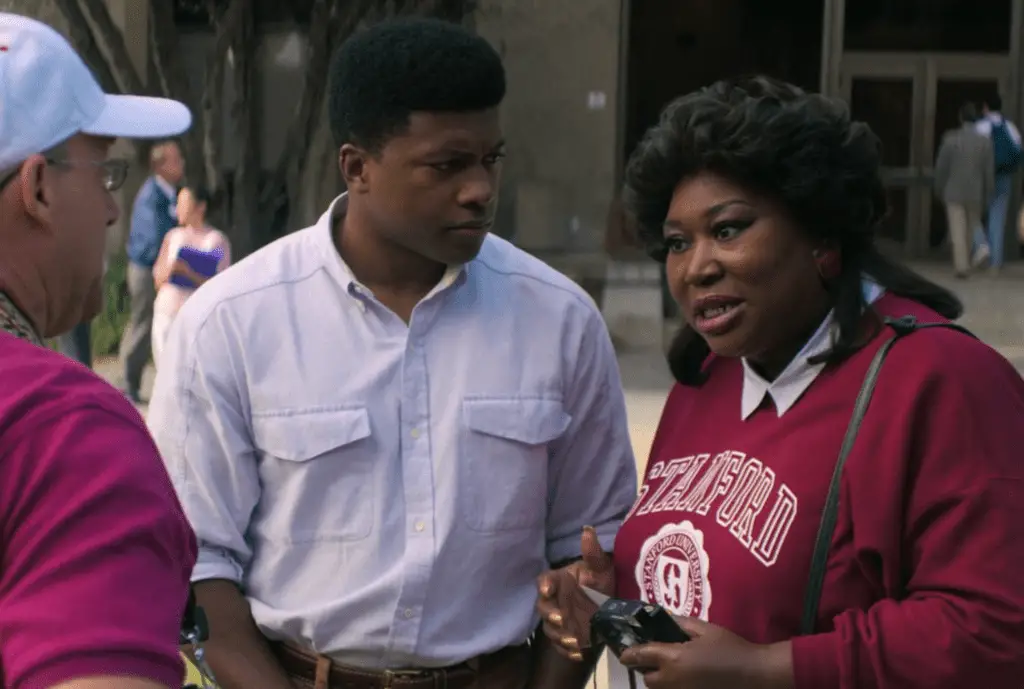
Another strong theme in both seasons of GLOW has been racial stereotypes and typecasting. In season 1, this was played mostly for laughs, showing Bash and Sam choosing offensive stereotyped characters for the women to play in an attempt to make the wrestling show as provocative as possible. As the modern audience, we can feel superior by laughing at how backwards things were in the 1980s.
And yet, are things really so different now? Season 2 makes us grapple with the real effects of those stereotyped personas on the actors’ lives. Though Tammé initially balked at the role of “Welfare Queen,” by season 2 she’s normalized it and plays the character with gusto. But we find out in episode 4 that she has carefully compartmentalized her job away from her personal life.
She visits her son at Stanford, and we learn that she has not told him any details about her current acting gig. She’s anxious when a fan recognizes her in front of her son, forcing her to tell him. Her son then wants to see one of her shows, which Tammé is reluctant to let him do. It’s painful to watch her discomfort at playing the offensive character in front of her horrified son. The racist caricature his mom plays in the ring, emphasizing her laziness and unearned wealth, has an extra layer of irony since Tammé works very hard for her modest income and is sending her son to an Ivy League college.
In the end, while being frank about how offensive the “Welfare Queen” persona is, Tammé’s son seems to recognize the kind of difficult choices actors of color have to make. He is compassionate with his mom, telling her how impressed he is with her wrestling moves and her strength. He checks in with how she’s feeling and takes her out to dinner. Their loving and supportive relationship helps lift the tone.
I was relieved that the show gave us a positive resolution to an otherwise hard-to-watch storyline. But I couldn’t help thinking about how many people still believe in the “welfare queen” stereotype. To this day, U.S. pundits and lawmakers continue to use similar arguments – such as people using their food stamps to buy lobster – to try to reduce government help for the needy. “Get A Job!” is still a refrain we hear from people angry about calls for healthcare reform (a particularly nonsensical response, since plenty of Americans have jobs and no healthcare.) And these arguments are racialized. The myth lives on of the Black mom with many kids, living off the dole and not having to work. It’s a myth that fuels racism and the passing of laws that hurt real single parents. We’re not anywhere near out of the woods on these stereotypes.
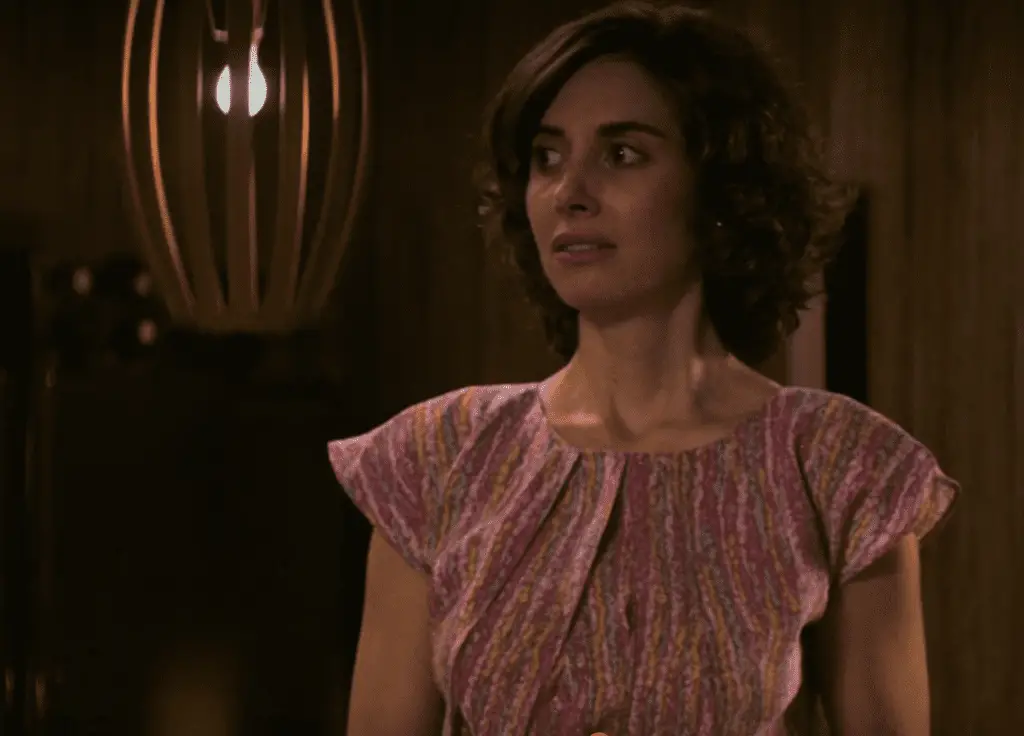
The most topical storyline in this season of GLOW is about sexual harassment in the entertainment industry. The show makes a direct comment on the #MeToo movement, showing us how the insidious sexism and abuse that’s been in the news recently has been going on in exactly the same way for 30 years and more.
The story is straightforward and all-too-familiar: A high-level network executive has his eye on Ruth and sets up a dinner meeting with her that is actually a trap. Ruth is worried right away when the restaurant host tells her the exec will meet her back in his hotel room. Her relief is immense when the lower-level exec, Glen, opens the door; she knows and trusts Glen, and the meeting can’t be about sex if Glen is there. But Glen is in on it. He leaves Ruth alone with the predator.
Deeply uncomfortable, Ruth complies with the exec’s request to show him some wrestling moves. She’s in that Catch-22 we’ve heard about so many times in recent headlines: being in a room with someone very powerful who can make or break your career, making inappropriate advances on you, and you’re put in the position of trying to say No in a way that is clear but also won’t make him angry. The exec quickly moves to creepy non-consensual touching in a practiced sort of way indicating that he’s done this a lot. The moment he steps out of the room, Ruth flees.
The audience breathes a sigh of relief that Ruth escaped, but there are consequences: the exec moves “GLOW” to a 2 a.m. slot. Their show seems doomed. On top of that, when Ruth tells Debbie what happened, Debbie is furious at her – she blames Ruth for what happened to their show. Debbie is the kind of person who believes in going along to get along, and she represents an attitude that we still hear way too much of in the present day: the idea that the best way to deal with inappropriate advances is to gently rebuff them. That we should work around known sexual harassers/assaulters who are in positions of power rather than try to remove them from those positions.
As John Oliver pointed out in a recent segment on workplace harassment, we’ve been saying we’ll tackle this problem since the 1980s. We still haven’t. Plus ça change, plus c’est la même chose – the more things change, the more they stay the same. GLOW puts this in front of us. Sure, we’ve got smartphones and we’ve lost the floppy disks, but as far as sexual harassment is concerned, it’s still 1985. It’s embarrassing, and it’s high time to fix it.
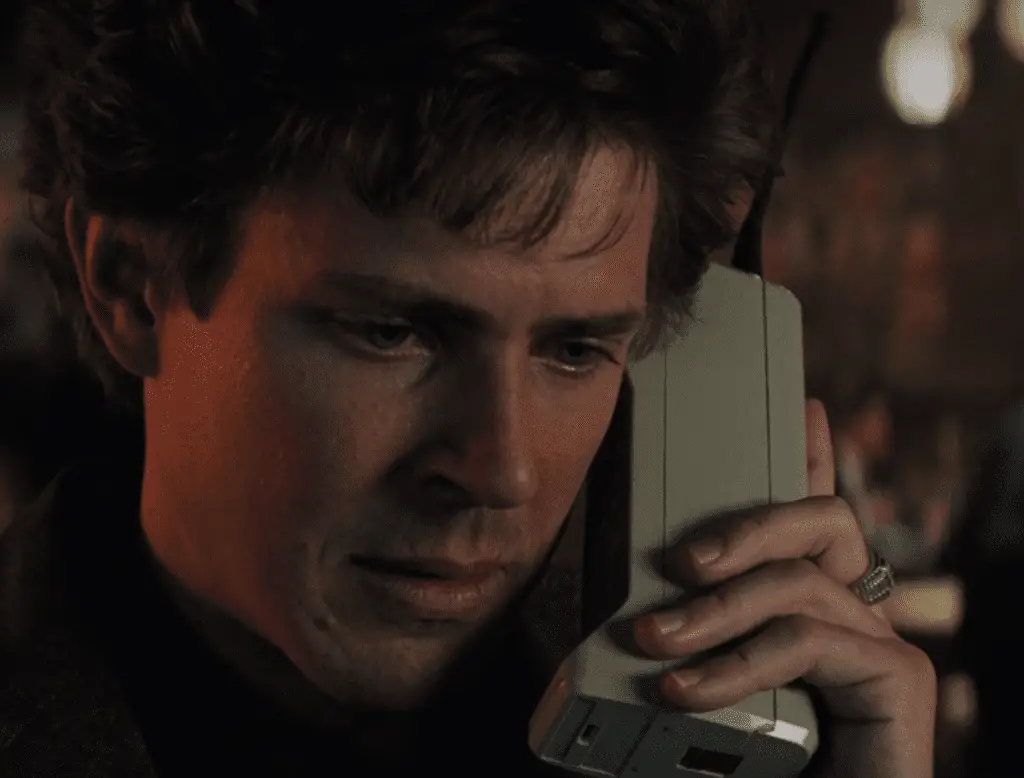
Unlike some of the other plotlines, showcasing issues that look very similar to today, Bash’s storyline in GLOW touched on a topic that has changed a great deal: homophobia and how society views AIDS. Of course, there is still discrimination towards queer people and towards people with AIDS, but our attitudes have changed tremendously in the past 30-plus years.
Early in season 2, Bash reveals to some of the wrestlers that his “butler”, Florian (his lover, in addition to actually working as Bash’s butler) has left their home after a fight they had. Upset, Bash searches for him and eventually finds that Florian has left town. Bash, a rich boy and coked-up Hollywood type, has never treated Florian very well – case in point, the creepy role mixture of letting your partner keep working as your employee – but we still feel for Bash as he comes to terms with Florian having left him for good without telling him, and the fact that Bash has very real pressures on him to stay closeted.
Towards the end of the season, the storyline picks up again. In the middle of a gleeful session of fielding phone calls from network executives with Debbie, Bash receives a phone call from a hospital. Florian has died. The official cause of death, the hospital worker tells Bash with a meaningful pause, was pneumonia. We watch Bash’s face as that sinks in. Shamefully, he declines to come see Florian’s body or do his duty as next-of-kin. He just tells the caller Florian’s mother’s name and hangs up.
In 1985, when the show takes place, AIDS was still not understood very well. This was in large part thanks to deliberate dragging of feet on the part of the Reagan administration to even take the disease seriously much less get appropriate funding to major health agencies in order to study it. Myths borne out of bigotry persisted long after 1983, when research definitively showed that AIDS was not transmitted by casual contact. Bash is in thrall to those myths, we find, as a later scene shows him refusing to enter his own home until a cleaning crew scrubs everything with bleach. He clearly thinks it is possible that the pathogen that causes AIDS could be spread by an infected person just touching things, and that it could remain active and infectious when exposed to air for long periods of time (also false).
AIDS was a death sentence in this time period. It killed people fast, and there were no antiretroviral treatments as there are now to keep people healthy and extend their lives. Florian looked healthy in a brief appearance in episode 1, and in only a couple of months, has gotten gravely ill and died.
Bash looks terrified in every scene after he finds out about Florian. He has no way of knowing whether he might be also infected with H.I.V.; the first commercial blood test for the virus was released in 1985, and he probably doesn’t know about it. In desperation, he appears to disavow his sexual identity completely, when he offers to marry Britannica to help with her visa status. He explains he doesn’t even mean this as just a paper marriage, he confesses love for her that we the viewers are skeptical of.
In terms of gay rights and acceptance, as well as medical science and stigma surrounding H.I.V. and AIDS, we have truly come a long way since the 1980s.
Florian and Bash’s story is the darkest of the show, and offers no resolution this season. This was a bit of a shock in an otherwise upbeat, feel-good show, but, I think, an important one lest we get too caught up in our 1980s nostalgia.
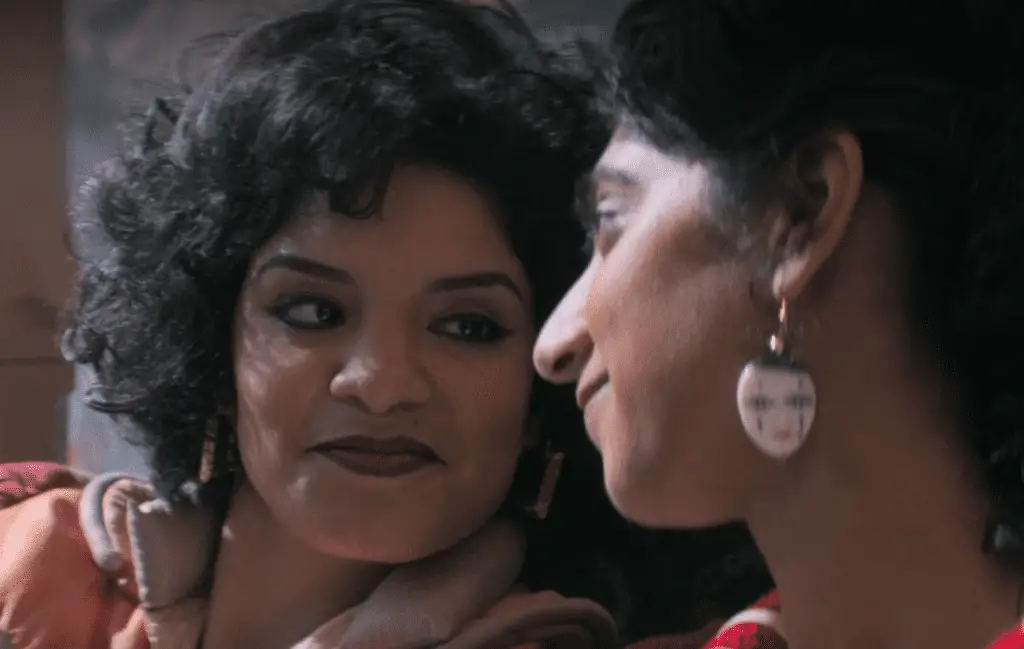
Nonetheless, I was happy that Bash and Florian’s wasn’t the only queer storyline in this season of GLOW. Yolanda, a new character this season, is an out-and-proud lesbian who wins over her fellow wrestlers. She especially wins over her roommate and dance partner, Arthie. Arthie is an endearing character who, in season 1, when Bash prompts her to describe her own type, suggests “intelligent and whimsical?” before Bash assigns her the terrorist persona of “Beirut.” Arthie and Yolanda grow close, decide to continue to live together after filming of “GLOW” is done, and kiss during the post-wedding wrestling melée. Arthie’s lovestruck face watching Yolanda do her pole dance in her other job is a wonderful moment. Their arc helps rescue the show from the “Bury Your Gays” trope that’s otherwise in operation with Florian.
The genius of this season of GLOW is how it balances both light and dark topics. It has fun with 1980s fashions and technology while not shying away from some of the uglier parts of life then, not to mention ugliness that hasn’t changed. Ultimately, it is a show about how a group of women create something fun together and support each other, and that’s something really different and new compared to the vast majority of TV in the past 30 years. Maybe we have come a little way, baby.

